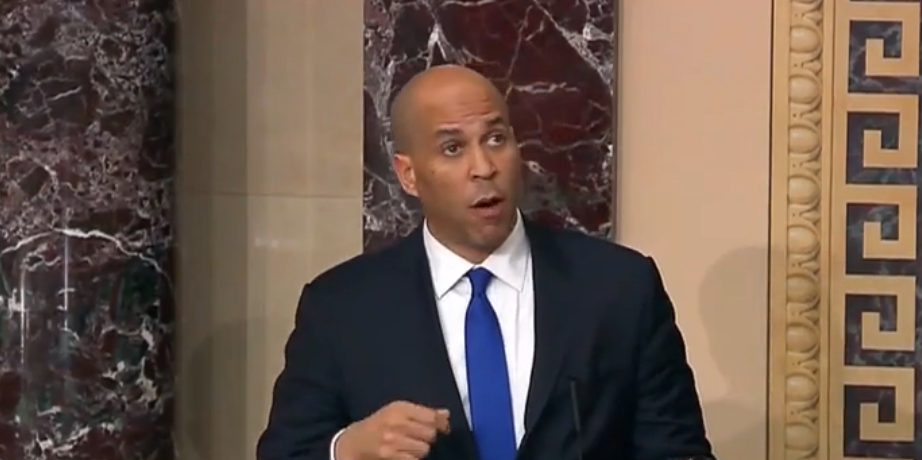Booker, Capito, Jones Reintroduce Bill to Establish Wastewater Grants for Low Income Communities

Booker, Capito, Jones Reintroduce Bill to Establish Wastewater Grants for Low Income Communities
Proposal aims to expand access to wastewater infrastructure in marginalized communities
WASHINGTON, D.C. — Today, U.S. Senators Cory Booker (D-NJ), Shelly Moore Capito (R-WV), and Doug Jones (D-AL) reintroduced the bipartisan Decentralized Wastewater Grant Act of 2020 to address the wastewater challenges faced by low-income communities, communities of color, and rural communities. U.S. Representative Terri Sewell (D-AL) will lead companion legislation in the House of Representatives.
Approximately 20 percent of Americans dispose of wastewater through their own sewage disposal systems. Because these systems have high maintenance costs, certain failures are likely to go unaddressed, potentially endangering the health of millions of Americans living in areas where water can be contaminated as a result of homes that lack a sewage system altogether or have a failing, improperly installed, or homemade septic system. This legislation would establish a grant program under the Clean Water Act, administered by the Environmental Protection Agency, to help low- and moderate-income households connect their homes to existing wastewater infrastructure or install or upgrade individually-owned decentralized wastewater systems.
“The health of our communities depends on access to basic sanitation systems,” Booker said. “We need to fight for those who are denied their right to a clean environment, and that fight starts with investments in our most vulnerable communities. This bipartisan legislation is an important step in addressing the crisis facing a staggering number of Americans. In a nation where nearly 200,000 housing units lack sewage systems, our focus must be on expanding access to quality wastewater infrastructure so that a community’s ability to pay for proper sanitation will not determine its health.”
“Having a functioning wastewater system is important when it comes to keeping families, individuals, and entire communities healthy,” Senator Capito said. “It’s hard for many across the country to imagine not having ready access to this basic service, however, this is sadly a reality in certain parts of rural states like West Virginia. This bipartisan legislation will ease the financial burden for West Virginians that wish to install wastewater systems on their property, benefiting themselves and the environment in our state.”
“In rural communities across the country, including Alabama's historically underserved Black Belt region, some families lack access to even basic wastewater systems,” Jones said. “This is a critical public health and safety issue, and we need an all hands on deck approach to solve this crisis. That’s why I’m proud to introduce legislation to build on the progress that we’ve made on the federal level to provide all Americans with access to the infrastructure and clean water they need.”
“Clean water and decent wastewater infrastructure are basic human rights that shouldn’t be restricted to only those who can afford them. In Alabama and many rural areas across the country, failing septic tanks and inadequate, unsafe wastewater infrastructure are far too common and pose health, economic and environmental risks to our communities,” Sewell said. “The bill introduced today provides additional funding for families to install and maintain septic systems, building upon our longstanding commitment to ending America’s wastewater crisis once and for all."
The grant program established by the Decentralized Wastewater Grant Act of 2020 would provide grants to qualified nonprofit organizations, which will then provide sub-grants to eligible individuals lacking adequate wastewater infrastructure. Directing funds to organizations with expertise in this issue will help ensure that grants reach those individuals who are most in need.
The Decentralized Wastewater Grant Act of 2020 is supported by Earthjustice, the National Onsite Wastewater Recycling Association, the Rural Community Assistance Partnership, GreenLatinos, the Tennessee Clean Water Network, the Mississippi River Collaborative, the Alabama Rivers Alliance, Conservation Alabama, the Southern Environmental Law Center, the Virginia Conservation Network, and the Illinois Council of Trout Unlimited. Read their support letter here.
Senator Booker has prioritized environmental justice throughout his time in public office. Dating back to his time as a tenant lawyer, City Council member, and mayor of Newark, he has seen first-hand how low-income communities and communities of color are disproportionately affected by tainted drinking water, toxic Superfund sites, and poor sanitation systems, among many other injustices. As Newark Mayor, Booker championed the cleanup of the Passaic River Superfund site and helped lead the revitalization of over 15 acres of formerly off-limits riverfront property. In 2018 in the Senate, he successfully included in the Farm Bill a bipartisan provision that would modify an existing grant program to help low- and moderate-income households install or upgrade individually-owned decentralized wastewater systems. And last year ,his bill to help states with lead in drinking water was signed into law. He is also the author of sweeping legislation that strengthens environmental justice protections for vulnerable communities and he is a founding member of the Senate’s Environmental Justice Caucus.





